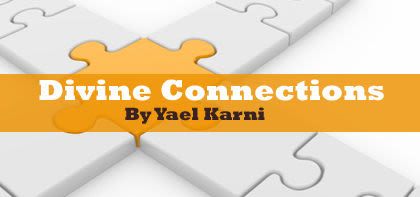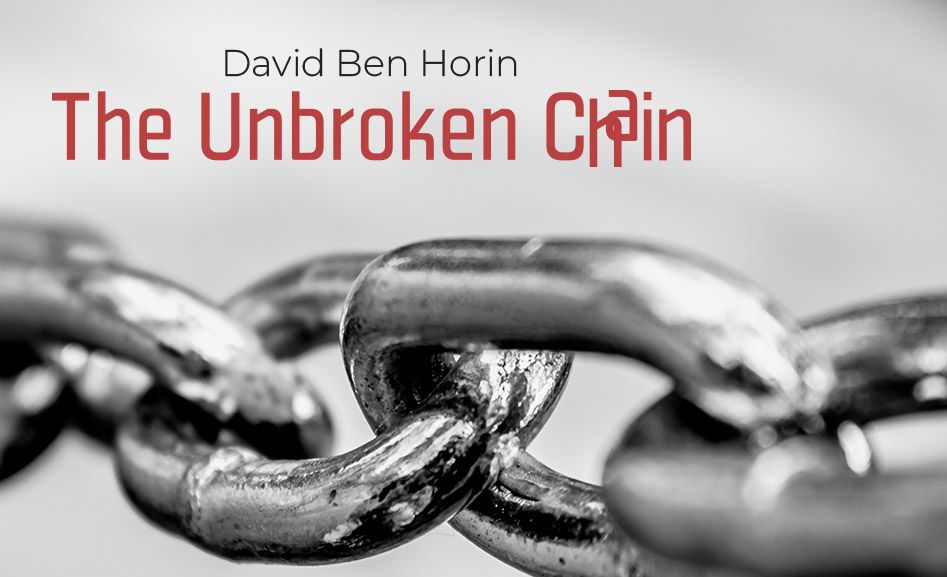
Divine Connections
True spirituality has to be based on one thing first and foremost: emunah. The belief that Hashem created me and everything else, that He interacts with me...

What is a mitzva?
The Torah, given to the Jewish People at Mount Sinai, contains the building blocks of creation and the key to bringing this lower, incomplete, world to its perfection. The Torah provides the precepts/laws and their details of how to do this. These are the mitzvot. The word mitzva comes from the Hebrew root, “to connect”; in other words, when I do a mitzva I automatically connect myself to the Divine, to true reality, and when I do an aveirah – a sin – I step out of reality [although it usually feels like it’s the other way round!].
There are 631 mitzvot and these parallel the form of the body. Rabbi Chaim Kramer in Anatomy of a Soul states that “ the 613 mitzvot divide into 248 positive commandments and 365 prohibitions… The human form has 248 limbs, corresponding to the 248 positive commandments of the Torah, and 365 connecting tissues, veins or sinews corresponding to the 365 prohibitions of the Torah [Zohar 1,170b]. Thus man was  fashioned in the pattern of the Torah.”
fashioned in the pattern of the Torah.”
So what’s the essence of mitzvot? There are three categories of mitzvot:
- testimony – for example, mezuzah, Shabbat, [to remind us of Hashem]
- mitzvot which seem not to have a logical explanation – for example, kashrut and the red heifer [which may test us in the area of emunah]
- mitzvot which do have a rational explanation, for example, laws between man and man, such as giving charity, laws of correct speech
All the laws of the Torah are designed to produce one thing: a perfected society based on an objective morality, a morality that produces justice, kindness, compassion to our fellow man, and connection to the Creator through the festivals and the inner life of Torah study and prayer.
These laws are meant to permeate every aspect of our being from the time we get up to the time we go to sleep. They cover everything from building the Land of Israel, human rights, employer-employee relations, respect for property, good business ethics, correct speech, justice for the weak and vulnerable, respect for the environment, care of animals, sexuality, parenthood and education, respect for the dead, charity, as well prayer and the festivals – the list is endless. They are not once weekly, or once yearly, stop-offs to spirituality, the quick fix, feel good factor. True spirituality has to be earned and whether or not we are starting right at the beginning or are well advanced in our observance the dangers of giving up too soon, apathy and coasting along will not be far away.
True spirituality then has to be based on one thing first and foremost: emunah. The belief that Hashem created me and everything else, that He interacts with me on a personal basis every moment of my existence, that He loves me and will guide me if I let Him, that everything that happens to me is for my benefit, whether seemingly good or bad, and that all that occurs is for a purpose, has to be the starting and end point for spiritual development.
So you might say, it all sounds good, but I think I’m a good, kind person so why do I have to do the mitzvot?
The first thing to say is that feeling good isn’t the same as doing good. The majority of the commandments relate to action, not thought. Why is this? Because the purpose of our existence is to bring potential into actual, so thinking that I’m a kind person won’t benefit anyone else but doing a kind act will.
The second thing is that when I do a mitzva, not only do I get reward for the deed itself but I get another reward, for the effort involved. So for example, let’s say there are two Jews, both asked to give charity for a particular cause. One loves giving charity, it’s his or her raison d’etre, and the other person is a bit mean. Both give to the charity but who gets the greater reward? The Jew with the more thrifty personality. Both get the reward for the deed but the person who has to overcome a personal resistance gets an extra reward. It seems to me that there’s a deep psychological underpinning inherent in this – when I have to overcome a resistance it actually builds my personality more than when something comes easy. Obviously, we need both. If everything came easy, we wouldn’t really grow that much, if everything came with hardship, then we’d give up and get depressed, so we need both aspects to the mitzva, mitzvot that we love doing and find easy and mitzvot that we need to make extra effort with.
The third thing is that I might feel yes, I am a charitable person and I do give so why do I have to told to do it and by how much [a Jew is supposed to give a 10th of their net income to charity]? Well, we’re talking here about objective morality, not moral equivalence. With moral equivalence, today I feel like giving charity but next month I won’t or society will decide that it isn’t necessary, but with objective morality, I submit to Hashem’s rules which first and foremost are perfect, and therefore apply at all times and in all generations – in this way society always benefits and I grow spiritually by negating my will to Hashem.
And where is the place where these mitzvot are ideally supposed to be performed? Of course, Eretz Yisrael [in fact, many mitzvot can only be performed in the Land of Israel].
Because the Torah, Eretz Yisrael and the Jewish People are considered one entity, indivisible from each other, and only in the Holy Land can Hashem’s divine plan be realized.












Tell us what you think!
Thank you for your comment!
It will be published after approval by the Editor.